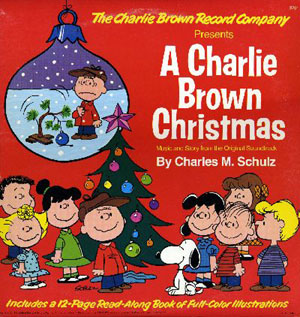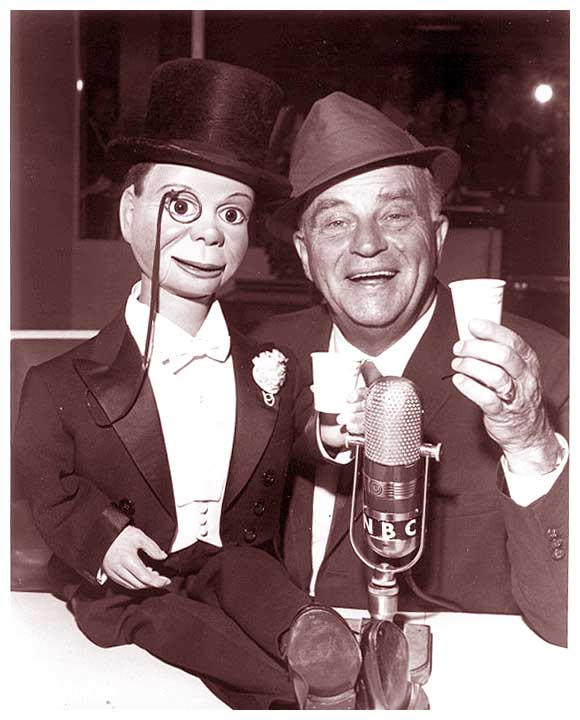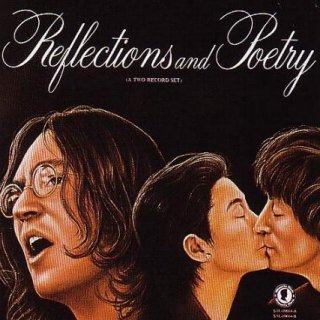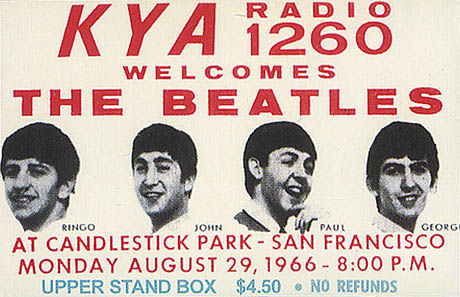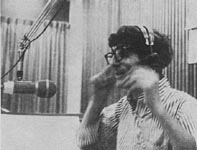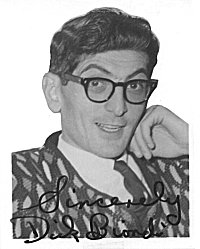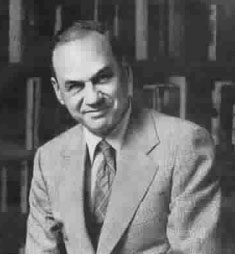
Happy Birthday, America! While you're heading out for your picnics and fireworks, we're reviewing the audio highlights of our country's second century with a scrapbook of American history narrated by Peabody Award-winning newsman Edwin Newman of NBC .
It was painstakingly compiled from the archives of NBC, the Library of Congress, the National Archives, and many private collections as well. It was produced in 1976 as a souvenir LP for the Bicentennial by the John Hancock Mutual Life Insurance Company. The LP was mastered with the Microgroove process, enabling the engineers to squeeze 45 minutes of audio on each side. The unedited 90 minute documentary contains 200 carefully selected soundbites, each representing an historic moment from our first 200 years. For this special hour-long broadcast, I chose 150 of those moments.
For the benefit of history buffs and scholars, I have provided a detailed listing of all 150 soundbites in this production. The dates provided here are based on many hours of research along with a few educated guesses. I welcome any corrections or suggestions you may have. For your enjoyment, I recommend that you print out a copy of this list and follow along as you listen. Special acknowledgement should go to the production team of Sam and Larry Miller, who did all of the original writing, production and research back in 1976.
"A String Of Pearls" - Glenn Miller and His Orchestra (1942 hit)
Message to Thomas Edison - P.T. Barnum (1890 wax cylinder)
"Turkey In The Straw" (New version of 1891 hit)
"Mary Had A Little Lamb" - Thomas Edison (1927 film soundtrack)
"Home, Sweet Home" (New version of 1891 hit)
Campaign Speech - William Jennings Bryan (1908 recreation of 1896 speech)
"Shine On Harvest Moon" (New version of 1909 hit)
North Pole Expedition Lecture - Robert E. Peary (1910 recording)
"Give My Regards To Broadway" - George M. Cohan (1939 version of 1905 hit)
"Take Me Out To The Ball Game" - Jack Norworth (1939 version of 1908 hit)
"Easy Winners" (New version of 1901 hit)
Square Deal Campaign Speech - Teddy Roosevelt (1913 recording)
"Alexander's Ragtime Band" - Irving Berlin (1939 version of 1911 hit)
"Over There" - Enrico Caruso (1918 hit)
"Stars And Stripes Forever" - John Philip Sousa's Band (1897 hit)
French Battlefield Speech - John J. Pershing (1918 recording)
War Bonds Announcement (1918 recording)
"A Pretty Girl Is Like A Melody" - John Steel (1919 hit)
Temperance Lecture - W.C. Fields (1946 recording)
Fight for Prohibition Sermon - Billy Sunday (1932 film soundtrack)
"Charleston" (New version of 1924 hit)
"Me And My Shadow" - Ted Lewis (New version of 1927 hit)
Jack Dempsey vs. Gene Tunney Prizefight (1949 recreation of 1927 broadcast)
"My Blue Heaven" (New version of 1927 hit)
Hamlet on Streamlined Shakespeare - John Barrymore (1937 broadcast)
"Rhapsody In Blue" (New Version of 1924 hit)
Talking Baseball with Kids - Babe Ruth (1944 broadcast)
Lindbergh Medal Presentation - Calvin Coolidge (1927 broadcast)
"An American In Paris" (New version of 1929 hit)
Stock Market Comedy Monologue - Eddie Cantor (1929 recording)
"Brother, Can You Spare A Dime?" - Bing Crosby (1932 hit)
Democratic Convention Speech - Franklin Roosevelt (1932 recording)
"Let's Have Another Cup O' Coffee" (1932 hit)
Plan To End All Plans Monologue - Will Rogers (1935 broadcast)
Future Of Aviation Lecture - Amelia Earhart (1931 recording)
Bruno Hauptmann News Bulletin (1935 broadcast)
Jack Benny on Town Hall Tonight - Fred Allen (1937 broadcast)
Hotel Edison Remote - Blue Barron and His Orchestra (1938 broadcast)
Rendezvous With Destiny Speech - Franklin Roosevelt (1936 broadcast)
"Gold Diggers' Song" (1933 film soundtrack)
Mae West on The Chase and Sanborn Hour - Edgar Bergen and Charlie McCarthy (1937 broadcast)
"College Rhythm" - Lyda Roberti (1934 film soundtrack)
Hindenburg Explosion News Report - Herb Morrison (1937 broadcast)
Max Schmeling vs. Joe Louis Prizefight - Clem McCarthy (1938 broadcast)
War of the Worlds - Mercury Theatre On The Air (1938 broadcast)
"Joltin' Joe Dimaggio" - Les Brown and His Band Of Renown (1941 hit)
New York Yankees vs. Chicago Cubs World Series (1938 broadcast)
Day of Infamy Address - Franklin Roosevelt (1941 broadcast)
"American Patrol" - Glenn Miller and His Orchestra (1942 hit)
Swing Music Dancers on Inside Story (1939 broadcast)
"Don't Be That Way" - Benny Goodman and His Orchestra (1938 hit)
The Pepsodent Show - Bob Hope (1943 broadcast)
V For Victory Speech - Eleanor Roosevelt (1944 broadcast)
"God Bless America" - Kate Smith (New version of 1938 hit)
War News Report on World News Roundup (1943 broadcast)
"Remember Pearl Harbor" - Sammy Kaye and His Orchestra (1942 hit)
"Comin' In On A Wing And A Prayer" (New version of 1943 hit)
"Praise The Lord And Pass The Ammunition" (New version of 1942 hit)
"I Left My Heart At The Stage Door Canteen" - Sammy Kaye and His Orchestra (1942 hit)
Recycling Used Fats Announcement (1942 broadcast)
Return to the Philippines Announcement - Douglas MacArthur (1944 recording)
D-Day Announcement - Dwight Eisenhower (1944 broadcast)
"Tico-Tico" - The Andrews Sisters (1944 hit)
Victory Garden Announcement (1942 broadcast)
Iwo Jima Beach Landing Report - Richard Mawson (1945 recording)
Henry's Mother Calling on The Aldrich Family (1949 broadcast)
German Surrender Announcement - Harry Truman (1945 broadcast)
Reading the Sunday Funnies - Fiorello LaGuardia (1945 broadcast)
Seabiscuit vs. War Admiral Horse Race - Clem McCarthy (1937 broadcast)
Atomic Bomb Bulletin - Ralph Howard Peterson (1945 broadcast)
Opening the Hall Closet on Fibber McGee And Molly (1942 broadcast)
Japanese Surrender Ceremony - Douglas MacArthur (1945 broadcast)
Farewell at Yankee Stadium - Babe Ruth (1947 broadcast)
"White Christmas" (New version of 1942 hit)
Draft Eisenhower Movement - Dwight Eisenhower (1948 recording)
Congressional Hearings on Communism - Whittaker Chambers and Alger Hiss (1948 recording)
Who's On First Baseball Routine - Bud Abbott and Lou Costello (1944 broadcast)
Victory for Dewey Prediction - H.V. Kaltenborn (1948 broadcast)
H.V. Kaltenborn Imitation - Harry Truman (1949 recording)
"Syncopated Clock" (New version of 1951 hit)
Milton Berle TV Variety Show - Texaco Quartet (1949 broadcast)
Korean Communist Attack Announcement - Harry Truman (1950 broadcast)
One Man's Family Radio Drama (1951 broadcast)
Korean Battlefront Report (1951 recording)
Farewell Address to Congress - Douglas MacArthur (1951 broadcast)
DeSoto Automobile Jingle (1953 recording)
Bobby Thompson Pennant-Winning Home Run - Russ Hodges (1951 broadcast)
Your Hit Parade TV Music Program (1952 broadcast)
Checkers Campaign Speech - Richard Nixon (1952 broadcast)
Indianapolis 500 Auto Race - Sid Collins (1952 broadcast)
"Blue Tango" (New version of 1952 hit)
Concession Speech - Adlai Stevenson (1952 broadcast)
Presidential Inauguration - Dwight Eisenhower (1953 broadcast)
You Bet Your Life TV Quiz Show - Groucho Marx and George Fenneman (1953 broadcast)
Congressional Hearings on Communism - Joseph Welch and Joseph McCarthy (1954 broadcast)
Howdy Doody TV Children's Program - Buffalo Bob Smith (1952 broadcast)
Communist Aggression in Vietnam - John Foster Dulles (1954 recording)
"Rock Around The Clock" - Bill Haley and His Comets (1954 hit)
Don Larson Perfect World Series Game (1956 broadcast)
Hula Hoop Jingle (1958 recording)
"Camelot" (New version of 1961 hit)
Inaugural Address - John Kennedy (1961 broadcast)
"The Times They Are A-Changing" (New version of 1964 hit)
"The Twist" (New version of 1960 hit)
Presidential Debate - John Kennedy (1960 broadcast)
Space Program Speech - John Kennedy (1961 recording)
Concession Speech - Richard Nixon (1962 broadcast)
John Glenn Friendship 7 Launch (1962 recording)
Cuban Blockade Announcement - John Kennedy (1962 broadcast)
Berlin Wall Speech - John Kennedy (1963 recording)
Kennedy Assassination News Report - Ron Jenkins (1963 broadcast)
First Presidential Address - Lyndon Johnson (1963 broadcast)
Civil Rights March Address - Martin Luther King, Jr. (1963 broadcast)
"Happy Together" (New version of 1967 hit)
Tonkin Gulf Announcement - Lyndon Johnson (1964 recording)
Senate Hearings - Dean Rusk (1966 recording)
Vietnam War Testimony (1966 recording)
Criticism of Vietnam War - Wayne Morse (1964 recording)
Securing the Peace Speech - Lyndon Johnson (1965 recording)
"We Shall Overcome" (1968 recording)
Memphis Speech - Martin Luther King, Jr. (1968 recording)
King Assassination News Report (1968 broadcast)
Eulogy for Dr. King - Robert Kennedy (1968 recording)
Campaign Withdrawal Announcement - Lyndon Johnson (1968 broadcast)
Eulogy for Robert Kennedy - Ted Kennedy (1968 broadcast)
Victory Speech - Richard Nixon (1968 broadcast)
New York Mets World Series Victory (1969 broadcast)
First Step On The Moon - Neil Armstrong (1969 broadcast)
Final Signoff on NBC Nightly News - Chet Huntley and David Brinkley (1970 broadcast)
"Good Morning Starshine" (New version of 1969 hit)
Woodstock Music Festival Announcement - Max Yasgur (1969 recording)
Chicago 7 Trial Verdict News Report (1970 broadcast)
Kent State Investigation - William Scranton (1970 recording)
Vietnamese Bombing Campaign - Richard Nixon (1970 recording)
"Theme From Shaft" (New version of 1971 hit)
Watergate Hearings - Sam Ervin (1973 recording)
Watergate Questioning - Howard Baker (1973 recording)
Watergate Testimony - Herman Talmadge (1973 recording)
White House Tapes News Report (1973 broadcast)
Whit House Tapes Announcement - Alexander Butterfield (1973 recording)
Spiro Agnew Resignation News Report (1973 broadcast)
"Tubular Bells" (New version of 1973 hit)
Resignation Address - Spiro Agnew (1973 broadcast)
Impeachment Hearings - Peter Rodino (1974 recording)
Henry Aaron Record-Breaking Home Run - Milo Hamilton (1974 broadcast)
Nixon Impeachment News Report (1974 broadcast)
Resignation Address - Richard Nixon (1974 broadcast)
"Hail To The Chief" (1974 recording)
Presidential Inauguration - Gerald Ford (1974 broadcast)
Straight Talk with America Announcement - Gerald Ford (1974 broadcast)
Inaugural Address - John Kennedy (1961 broadcast)
Pearl Harbor Fireside Chat - Franklin Roosevelt (1941 broadcast)
Campaign Speech - William Jennings Bryan (1908 recreation of 1896 speech)
The unedited 90 minute LP is titled "Independence 200". Copies are available from private collectors and rare record dealers, and
Amazon.com has new and used copies for sale. Next Sunday is Bill Cosby's 72nd birthday. Tune in for my special birthday tribute.
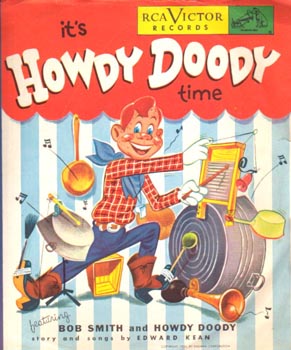 Say, kids, what time is it? It's Howdy Doody Time! December 27, 1941 is Howdy's birthday, according to the Howdy Doody fan club. The truth is that Howdy originated as a voice on Bob Smith's radio show around 1947. He character was originally named Elmer, but his annoying habit of saying "Howddeee-dooodeee" gave him his famous nickname.
Say, kids, what time is it? It's Howdy Doody Time! December 27, 1941 is Howdy's birthday, according to the Howdy Doody fan club. The truth is that Howdy originated as a voice on Bob Smith's radio show around 1947. He character was originally named Elmer, but his annoying habit of saying "Howddeee-dooodeee" gave him his famous nickname.
